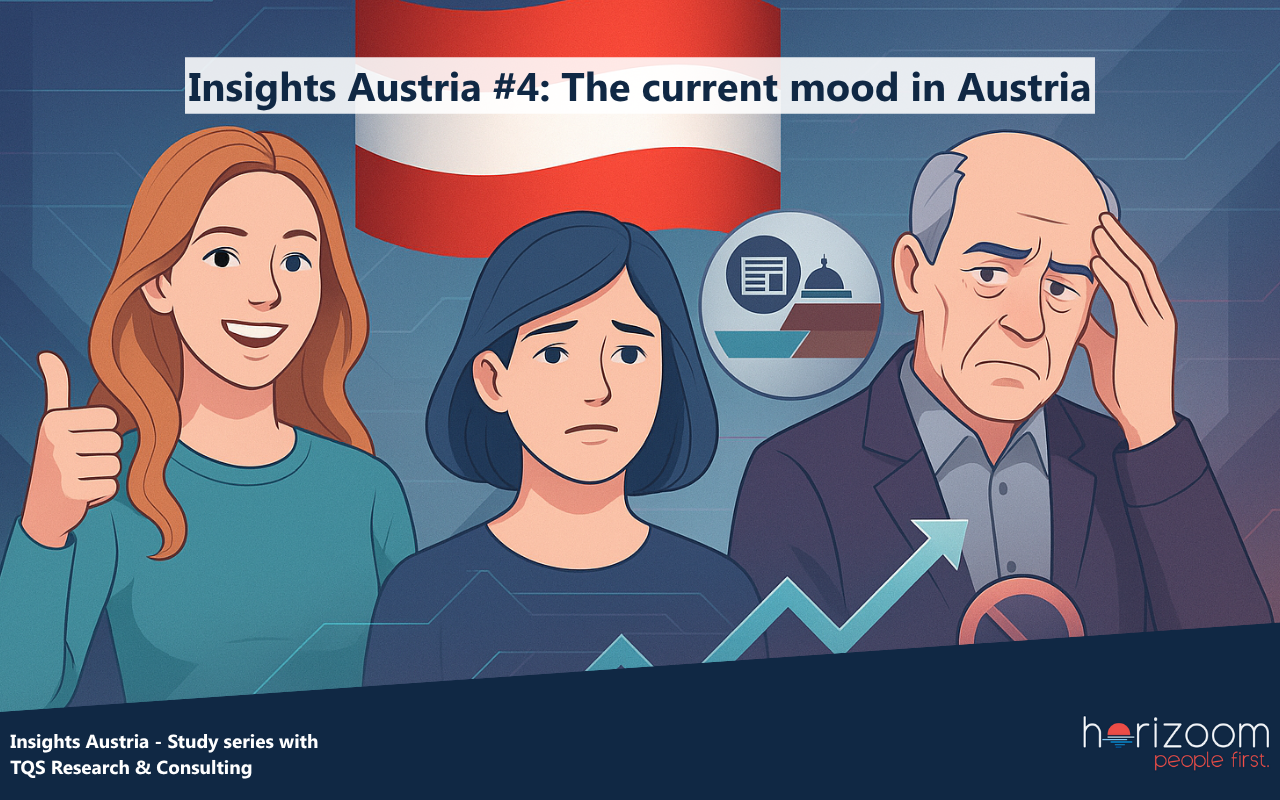Austrians have mixed feelings about current developments – trust in the media and politics remains divided
More than two-thirds of Austrians (69%) say they are somewhat to very negatively affected by current news, information, and developments. Young people between the ages of 16 and 29 are significantly more optimistic than respondents aged 40 and above. Trust in the media also presents a divided picture: 55% of the population trust the media, while 45% have little or no trust. It is noteworthy that 15% say they do not trust the media at all. Once again, the youngest age groups up to 29 years old show the highest level of trust. Trust in politics has improved slightly since the formation of the government. During the transition phase, only 20% of Austrians trusted the government to take the right measures for the country. In March, this figure was 28%, and it currently stands at 26%. Nevertheless, 74% of the population continues to express little to no trust in political leadership. In contrast, the security situation in Austria is perceived much more positively. 68% of those surveyed currently feel somewhat to very safe. The subjective feeling of security has thus recovered: between March and June of this year, the proportion of those who felt unsafe reached a low point of 38%.
High job security in Austria – young employees show increased willingness to change jobs
The vast majority of working people in Austria are currently optimistic about their professional situation: 85% feel that they have a high level of job security and see little risk of losing their current job. Loyalty to employers is equally stable – 80% of working people do not plan to change jobs in the foreseeable future. At the same time, however, around one-fifth of employees remain mobile and say they want to change employers within the next twelve months. The youngest age group, 16 to 29-year-olds, is particularly striking: Here, the willingness to change jobs is 27 percent – significantly higher than among 40- to 49-year-olds (16%) and 50- to 65-year-olds (13%).
Financial situation stabilizes slightly – but savings potential remains limited
Slightly more than half of the population (53%) assesses their own financial situation as positive. At the same time, around one in eight (13%) say they are struggling to make ends meet. The picture is mixed when it comes to saving behavior: for 32% of Austrians, nothing has changed, while 19% say they are able to save more than in the previous year. However, just under half (48%) report that they are able to put less money aside. Overall, the figures are largely stable compared to last year, but are significantly below the level of December last year, indicating that the financial situation of many households remains tense. Almost half of Austrians (48%) say they have slightly or significantly less money available for daily living than before. Inflation is particularly noticeable in key areas of life—especially food, restaurants, energy, and fuel. This development shows that the persistently high cost burden continues to have a noticeable impact on many people’s everyday lives and significantly restricts their financial leeway.
Sustainability is gaining importance—but skepticism about climate protection remains high
For 59 percent of Austrians, sustainability already plays a noticeable role in everyday life and influences everyday decisions – from consumption to mobility behavior. It is clear that women continue to be more concerned about this issue. At the same time, skepticism about the effects of climate protection measures remains high: 41 percent of those surveyed express doubts that these measures will have a positive long-term impact on our future. Only 16 percent are somewhat to very optimistic about the current state of climate protection measures. Overall, a slightly positive trend in perception has been noticeable since June – the population is thus somewhat more hopeful, albeit still cautious, about climate policy.
Social cohesion in Austria is declining significantly
Perceived social cohesion in Austria has deteriorated significantly in recent months. The proportion of the population that rates social interaction and mutual support as somewhat to very negative has risen significantly – from 50 percent in March to 58 percent in June and now 66 percent. In contrast, the proportion of those who rate social cohesion positively has fallen from 50 percent to 34 percent over the same period. This development highlights increasing social polarization and growing concern about social cohesion in Austria.
Personal future prospects remain stable – older generation takes a more critical view of the future
More than two-thirds of Austrians (67%) rate their personal development and future prospects as somewhat to very positive. This figure is largely stable compared to February and underscores an overall confident attitude among the population. However, the 50 to 65 age group stands out, as they view their personal future much more critically than younger Austrians.
Further details on the study, including a chart report: http://www.blog.tqs.at

